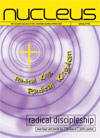Your first reaction to this enigma may be to dismiss the scenario, simply because it is so rare that you are unlikely to encounter it in everyday medical practice. However, the principles we will examine here are applicable to many beginning of life dilemmas and, as biotechnology pushes the boundaries further, PGD may become almost as common as in vitro fertilisation (IVF). We need to be ready with well thought out reasons for the position we take. There are two key questions. First, can PGD ever be acceptable to a Christian? Second, are there any potential pitfalls in creating a 'saviour sibling'?
It is important to understand the process involved in PGD if we are to evaluate it ethically. An embryo is selected at the eight-cell stage that has an exact HLA (histocompatibility leukocyte antigen) match for the sibling that requires the tissue for donation. Natural siblings have a one in four chance of being an HLA match. If a living donor does not exist, some parents will be willing to try any route possible to help treat their sick child.
Emotions will be running high and that in itself will make the likelihood of a 'situational ethic' greater than a reasoned Christian one (ie one based on practicalities rather than right or wrong). It is important, as always, when setting out our arguments not to lose sight of the real people involved and to maintain a Christ-like compassion for them.
PGD requires the same initial process as IVF. In Enigma 1 in this series I dealt with some potential difficulties of IVF. If the fertility specialist only created the two embryos legally allowed to be implanted in the mother in each cycle, no early human life would be wasted. However, PGD requires
the doctors to seek out the HLA match amongst many embryos; the favoured ones will be implanted and those that don't match up are destroyed. This embryonic selection on the basis of a good that one human has and another lacks does not sit comfortably with the Bible's teaching that God has created us all equal in his sight.
In Enigma 12 we looked at pre-natal diagnosis and selective abortion for fetal abnormality. I concluded that abortion for physical defect is wrong. PGD is one step further down the track: discrimination on the basis of having, or not having, a desired genetic tissue type. This too is wrong, especially if it means that other human beings with potential are not given the opportunity to grow because they do not fit the selection criteria. UK law has been revised to allow PGD on a case-by-case licence. The lobby for designer babies of the right sex and height, eye and hair colour, and possibly IQ is not so far removed. If we justify embryo destruction for medical cure, how long will it be until anything that is achievable is acceptable?
Midwives speak of IVF children as 'special babies'. Presumably a saviour sibling must be a 'really special baby'? The downside is that this special baby has been brought into the world specifically to help someone else live. Of course the parents will love him or her and no one can argue that the child will be treated merely as a consumer product. However, there will be a gradual dawning on this young human, as he grows older, that his co-operation is required, even presumed, to help his sister live. Jodi Picoult's gripping book, My Sister's Keeper imagines the increasingly complicated life of a saviour sibling:
Anna is not sick, but she might as well be. By the age of thirteen, she had undergone countless surgeries, transfusions and injections to help her sister, Kate, fight leukaemia. Anna was born for this purpose, her parents tell her, which is why they love her even more. But now she can't help but wonder what her life would be like if it weren't tied to her sister's. So she makes a decision that for most, at any age, would be too difficult to bear. She sues her parents for the rights to her own body.
A little extreme, you may say, but an extremely well written novel. The reality is that whilst the BMA has supported recent cases such as the Hashmis and the Whitakers in their quest for PGD, its actions are in direct contradiction to its mantra that consent to medical procedures should always be informed. In the eyes of the BMA the most important aspects of ethical decision-making are confidentiality and informed consent. But this baby, toddler and child was never asked whether she wanted to suffer for her sister's benefit.
In conclusion, I don't think medicine should ever require that a cure arise from some other human's death, however early in development. As a Christian haematologist I think you should seek to explain all the treatment options to the parents and not gloss over the potential errors in PGD (one in 20) and the ethical dilemmas that arise. I suggest that directly referring a couple for PGD is ethically similar to referring a woman for an abortion.
Further Reading
- Engel J, Berry C. Saviour Siblings. CMF File 28. London: CMF, 2005
- Wenham J. Ethical Enigma 1. Nucleus 2002: October:36,37
- Wenham J. Ethical Enigma 12. Nucleus 2005: July:38,39
- Song R. Biotechnology and theology. Triple Helix 2006; Winter:12,13
- Picoult J. My Sister's Keeper. London: Hodder and Stoughton, 2005
































